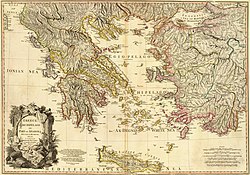
Back ملطية (مدينة إغريقية) Arabic Milet Azerbaijani Мілет Byelorussian Милет Bulgarian মিলেটাস Bengali/Bangla Miletos Breton Milet Catalan میلیتۆس CKB Milét Czech Miletus Welsh
Μῑ́λητος Milet | |
 | |
| Location | Balat, Didim, Aydın Province, Turkey |
|---|---|
| Region | Aegean Region |
| Coordinates | 37°31′49″N 27°16′42″E / 37.53028°N 27.27833°E |
| Type | Settlement |
| Area | 90 ha (220 acres) |
| History | |
| Builder | Minoans (later Mycenaeans) and then Ionians (the later on a former Anatolian site)[1][2][3] |
| Site notes | |
| Public access | Yes |
| Website | Miletus Archaeological Site |
| History of Greece |
|---|
 |
|
|
Miletus (/maɪˈliːtəs/; Greek: Μῑ́λητος, romanized: Mī́lētos; Hittite: 𒈪𒅋𒆷𒉿𒀭𒁕 Mīllawānda or 𒈪𒆷𒉿𒋫 Milawata (exonyms); Latin: Mīlētus; Turkish: Milet) was an ancient Greek city on the western coast of Anatolia, near the mouth of the Maeander River in ancient Ionia.[3][4][5] Its ruins are located near the modern village of Balat in Aydın Province, Turkey. Before the Persian rule that started in the 6th century BC, Miletus was considered among the greatest and wealthiest of Greek cities.[6][7]
Evidence of the first settlement at the site has been made inaccessible by the rise of sea level and deposition of sediments from the Maeander. The first available evidence is of the Neolithic. In the early and middle Bronze Age the settlement came under Minoan influence. Recorded history at Miletus begins with the records of the Hittite Empire, and the Mycenaean records of Pylos and Knossos, in the Late Bronze Age. Miletus was a Mycenaean stronghold on the coast of Asia Minor from c. 1450 to 1100 BC.
The 13th century BC saw the arrival of Luwian language speakers from south central Anatolia calling themselves the Carians. Later in that century other Greeks arrived. The city at that time rebelled against the Hittite Empire. After the fall of that empire the city was destroyed in the 12th century BC and starting about 1000 BC was resettled extensively by the Ionian Greeks. Legend offers an Ionian foundation event sponsored by a founder named Neleus from the Peloponnesus.
The Greek Dark Ages were a time of Ionian settlement and consolidation in an alliance called the Ionian League. The Archaic Period of Greece began with a sudden and brilliant flash of art and philosophy on the coast of Anatolia. In the 6th century BC, Miletus was the site of origin of the Greek philosophical (and scientific) tradition, when Thales, followed by Anaximander and Anaximenes (known collectively, to modern scholars, as the Milesian school), began to speculate about the material constitution of the world, and to propose speculative naturalistic (as opposed to traditional, supernatural) explanations for various natural phenomena.
- ^ Alice Mouton; Ian Rutherford; Ilya Yakubovich (7 June 2013). Luwian Identities: Culture, Language and Religion Between Anatolia and the Aegean. BRILL. pp. 435–. ISBN 978-90-04-25341-4.
- ^ Alan M. Greaves (25 April 2002). Miletos: A History. Taylor & Francis. pp. 71–. ISBN 978-0-203-99393-4.
The political history of Miletos/Millawanda, as it can be reconstructed from limited sources, shows that despite having a material culture dominated by Aegean influences it was more often associated with Anatolian powers such as Arzawa and the Hittites than it was with the presumed Aegean power of Ahhijawa
- ^ a b Sharon R. Steadman; Gregory McMahon; John Gregory McMahon (15 September 2011). The Oxford Handbook of Ancient Anatolia: (10,000-323 BCE). Oxford University Press. p. 369 and 608. ISBN 978-0-19-537614-2.
They had certainly been familiar with the territory earlier, in the Late Bronze Age, by way of commercial and political interests, and perhaps even trading posts, but now they came to stay. In the case of such settlements as Miletus and Ephesus, as implied, the Greeks chose the sites of former Anatolian cities of prominence.
- ^ Luc-Normand Tellier, Urban World History: An Economic and Geographical Perspective, p. 79: “The neighboring Greek city of Miletus, located on the Meander river was another terminal of the same route; it exerted certain hegemony over the Black sea trade and created about fifty commercial entrepôts in the Aegean sea and Black sea region...”
- ^ Carlos Ramirez-Faria (1 January 2007). Concise Encyclopedia Of World History. Atlantic Publishers & Dist. pp. 305–. ISBN 978-81-269-0775-5.
- ^ A Short History of Greek Philosophy By John Marshall page 11 “For several centuries prior to the great Persian invasion of Greece, perhaps the very greatest and wealthiest city of the Greek world was Miletus”
- ^ Ancient Greek civilization By David Sansone page 79 “In the seventh and sixth centuries BC the city of Miletus was among the most prosperous and powerful of Greek poleis.”
